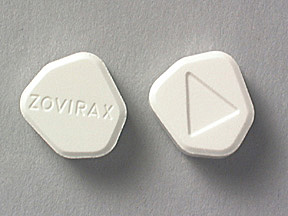Zovirax
Generic name: acyclovir (oral) [ a-SYE-klo-veer ]
Drug class: Purine nucleosides
What is Zovirax?
Zovirax is an antiviral drug. Acyclovir slows the growth and spread of the herpes virus in the body.
Zovirax is used to treat infections caused by herpes viruses, such as genital herpes, cold sores, shingles, and chickenpox.
Zovirax will not cure herpes, but it can lessen the symptoms of the infection.
Warnings
Take Zovirax for the entire length of time prescribed by your doctor. Your symptoms may get better before the infection is completely treated.
Treatment with Zovirax should be started as soon as possible after the first appearance of symptoms (such as tingling, burning, blisters).
Herpes infections are contagious and you can infect other people, even while you are being treated with Zovirax. Avoid letting infected areas come into contact with other people. Avoid touching an infected area and then touching your eyes. Wash your hands frequently to prevent passing the infection to others.
Follow all directions on your medicine label and package. Tell each of your healthcare providers about all your medical conditions, allergies, and all medicines you use.
Before taking this medicine
You should not take Zovirax if you are allergic to acyclovir or valacyclovir (Valtrex).
To make sure Zovirax is safe for you, tell your doctor if you have:
-
kidney disease; or
-
a weak immune system (caused by disease or by using certain medicine).
Tell your doctor if you are pregnant or breastfeeding.
Herpes can be passed to your baby during childbirth if you have a genital lesion when your baby is born. If you have genital herpes, it is very important to prevent herpes lesions during pregnancy. Take your medicine as directed to best control your infection.
It may not be safe to breastfeed while using this medicine. Ask your doctor about any risk.
Zovirax should not be given to a child younger than 2 years old.
How should I take Zovirax?
Take Zovirax exactly as prescribed by your doctor. Follow all directions on your prescription label and read all medication guides or instruction sheets.
Start taking Zovirax as soon as possible after the first appearance of symptoms (such as tingling, burning, blisters).
Read and carefully follow any Instructions for Use provided with your medicine. Ask your doctor or pharmacist if you do not understand these instructions.
Shake the oral suspension (liquid) before you measure a dose. Use the dosing syringe provided, or use a medicine dose-measuring device (not a kitchen spoon).
Acyclovir doses are based on weight (especially in children and teenagers). Your dose needs may change if you gain or lose weight.
Drink plenty of water while you are taking Zovirax to keep your kidneys working properly.
Use this medicine for the full prescribed length of time, even if your symptoms quickly improve. Skipping doses may increase the risk of your virus becoming resistant to medication.
Lesions caused by herpes viruses should be kept as clean and dry as possible. Wearing loose clothing may help to prevent irritation of the lesions.
Store at room temperature away from moisture and heat.
What happens if I miss a dose?
Take the medicine as soon as you can, but skip the missed dose if it is almost time for your next dose. Do not take two doses at one time.
What happens if I overdose?
Seek emergency medical attention or call the Poison Help line at 1-800-222-1222.
What to avoid
Herpes infections are contagious and you can infect other people, even while you are being treated with Zovirax. Avoid letting infected areas come into contact with other people. Avoid touching an infected area and then touching your eyes. Wash your hands frequently to prevent passing the infection to others.
Taking this medicine will not prevent you from passing genital herpes to your sexual partner. Avoid sexual intercourse while you have active lesions or the first symptoms of an outbreak. Genital herpes may still be contagious through "viral shedding" from your skin, even if you have no symptoms.
Zovirax side effects
Get emergency medical help if you have signs of an allergic reaction to Zovirax: hives; difficult breathing; swelling of your face, lips, tongue, or throat.
Call your doctor at once if you have:
-
easy bruising or bleeding, purple or red pinpoint spots under your skin;
-
changes in behavior;
-
confusion, hallucinations; or
-
signs of a kidney problem - little or no urinating; painful or difficult urination; swelling in your feet or ankles; feeling tired or short of breath.
Common Zovirax side effects may include:
This is not a complete list of side effects and others may occur. Call your doctor for medical advice about side effects. You may report side effects to FDA at 1-800-FDA-1088.
Related/similar drugs
What other drugs will affect Zovirax?
Acyclovir can harm your kidneys, especially if you also use certain medicines for infections, cancer, osteoporosis, organ transplant rejection, bowel disorders, high blood pressure, or pain or arthritis (including Advil, Motrin, and Aleve).
Other drugs may interact with acyclovir, including prescription and over-the-counter medicines, vitamins, and herbal products. Tell your doctor about all your current medicines and any medicine you start or stop using.
Frequently asked questions
- Can you drink alcohol while taking acyclovir?
- What would be the benefits of taking valacyclovir vs acyclovir?
More about Zovirax (acyclovir)
- Check interactions
- Compare alternatives
- Reviews (17)
- Drug images
- Latest FDA alerts (3)
- Side effects
- Dosage information
- During pregnancy
- Drug class: purine nucleosides
- Breastfeeding
Patient resources
Other brands
Professional resources
Other brands
Other formulations
Related treatment guides
Further information
Remember, keep this and all other medicines out of the reach of children, never share your medicines with others, and use Zovirax only for the indication prescribed.
Always consult your healthcare provider to ensure the information displayed on this page applies to your personal circumstances.
Copyright 1996-2025 Cerner Multum, Inc. Version: 8.01.

